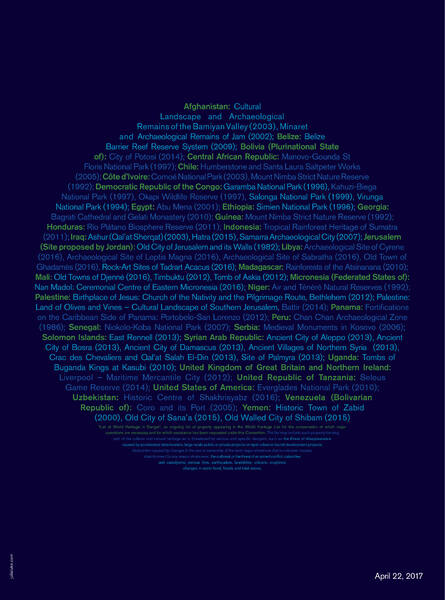Director of World Heritage Centre’s Message on the occasion of International “Earth Day” 2017
International Earth Day is celebrated every year on 22 April to remind each of us that the Earth and its ecosystems provide us with life and sustenance. It also recognizes a collective responsibility, as called for by the 1992 Rio Declaration, to promote harmony with nature and the Earth to achieve a just balance among the economic, social and environmental needs of present and future generations of humanity.
The 2017 campaign theme for Earth Day is “Environmental & Climate Literacy”. Education is our foundation for progress. We need to build a global citizenry, which is fluent in the concepts of climate change, and aware of its unprecedented threat to our planet. We need to empower everyone with knowledge to act in defense of environmental protection.
Inclusiveness is at the heart of International Earth Day. It seeks to share with all people the values associated with the planet, with regard to humans and nature as part of a single system, ensuring that our relationship with nature is one that allows life to continue.
Modern civilization can look to and learn from long term experiences of local communities, cultures and indigenous peoples for best practices. How human beings should relate to the Earth and what our responsibility towards future generations should be, are among the most challenging questions. The World Heritage Convention undoubtedly marks an important step forward in the awareness of the obligation of humanity as a whole to respect and safeguard natural and cultural heritage, of Outstanding Universal Value. World Heritage properties play an integral part in the sustained use of natural and cultural resources. It is crucial to protect well-selected sites in their integrity as World Heritage, thus ensuring that future generations may continue to enjoy the majesty and diversity of Earth as we know it today, but also continue to benefit from the fundamental life-support services provided by those sites, such as clean water, fresh air, pollination, etc. In addition, cultural practices, worldwide, rely on specific elements of biodiversity for their very existence and expression.
World Heritage is a building block for peace and sustainable development. It is a source of identity and dignity for local communities, a wellspring of knowledge and strength to be shared. Local communities are at the heart of World Heritage management and crucial for durable conservation efforts that contribute to sustainable livelihoods.
The challenges facing World Heritage conservation, combined with the effects of climate change, are unprecedented in human history. The need for joint and collective collaboration among all stakeholders has never been more important.
We must work together to safeguard the irreplaceable World Heritage resources, where people may reflect, study, enjoy the benefits of the Earth and appreciate the diversity of culture and nature.
Happy Earth Day!
